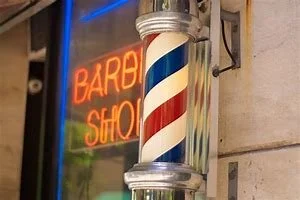Veteran Seoul barber still does things his way
By John M. Glionna, Los Angeles Times, January 27, 2012
SEOUL — For more than 46 years, they've been inseparable, this quirky barber and his ramshackle excuse for a shop. People who know them both say it's hard to tell which is more eccentric.
Standing just 5-foot-1, Lee Nam-yul uses a special footstool to reach everyone but the shortest customers. He likes to talk, his regulars say, but not always listen.
At 63, the third-generation craftsman has old-school tastes. He owns no cellphone, no computer. He has an electric cutter he rarely uses, preferring the eight pairs of stainless-steel scissors and other simple hand tools his grandfather used in this same shop. He maintains a barber's fetish for German-made straight razors.
He doesn't like to part with things, like his straight razor from the 1880s.
"Things might be old," he says, "but they work."
Between customers, Lee draws portraits of sometimes ghastly characters such as Osama bin Laden and Norwegian killer Anders Behring Breivik brandishing a semiautomatic rifle. He makes no excuses: "If I draw normal people, nobody pays attention. Pass 10 strangers on the street today and four or five are deranged anyway."
Lee's off-the-wall character is outdone perhaps only by his place of business. If Humpty-Dumpty had built a house, it might look like this: something fragile, teetering, not-quite-put-together-again. It was built 85 years ago, when this working-class Seoul neighborhood was just a cow pasture.
Everything is original (and that's not necessarily a good thing). Until the 1960s, the place had a thatched roof, but it blew off in a storm. The windows resemble a set of bad teeth, most panes cracked and covered over with tape. The two aging French doors don't come together right, leaning like a man with one leg shorter than the other. Seven layers of foam, one on top of the other, have been glued around the door frame to keep out the winter wind and, by the looks of it, hold the whole place together.
"I wanted to fix things, but it didn't work out," Lee says. "In this place, you fix one thing, the rest will fall down."
Barbers like Lee are a dying breed. In the 1980s, South Korea had 85,000 traditional barbershops with their spinning poles and leather chairs. Now fewer than 10,000 remain, as most young men prefer unisex hair salons.
Still, Lee has a cadre of regulars, most of them old-timers like himself, like 56-year-old Cho Yong-ki, a retired South Korean army lieutenant colonel. "Nobody should come here, judging by the exterior, but a lot of people do," Cho says. "I'll keep coming until the place falls apart."
Lee started cutting hair in 1965 at age 16. He was the only one of five sons to enter the business, which opened in the family home in 1927 when his grandfather became the second Korean issued a barbering permit by the occupying Japanese.
For years, Lee worked alongside his father until the older man retired in the 1970s, Lee's hair-trimming heyday, when the shop handled 80 heads a day and four barbers worked under him.
Lee says his older brother was a neighborhood gangster and that earned the shop respect. But after his brother died, the street punks moved in, commandeering his chairs, demanding a payoff.
"They were such little fish, they couldn't call out my brother's name when he was alive," Lee says. "But when the mountain lion is gone, the rabbits play king."
Finally, Lee says, he took a stand. He waves a straight razor, suggesting violence, and then acknowledges that he bought the young men alcohol to make them go away.
Lee was born in the building, so he's at home with the concrete floor, hole-studded ceiling and potbelly stove on which his wife sometimes cooks sweet potatoes that burn fingers at the touch. For heat, he burns coal in the stove, using pliers to open the door and throw in the black bricks.
Once a writer published a poem about the place, which read in part, "The stopped wall clock hangs at a rusty spot… An aged customer comes to look for the old memories… His youth gets cut."
Lee wants his only son to eventually take over the business so there'll be a fourth generation of Lee family barbers. In the meantime, he's teaching the youngster a lesson: On some days, the razor is sharper than on others.
"Today the razor's feeling good," he says. "It took me 30 years to realize that the razor reflects my mood."
Lee never wants to leave the place.
"This building is peculiar, like me," he says. "It matches my personality."
